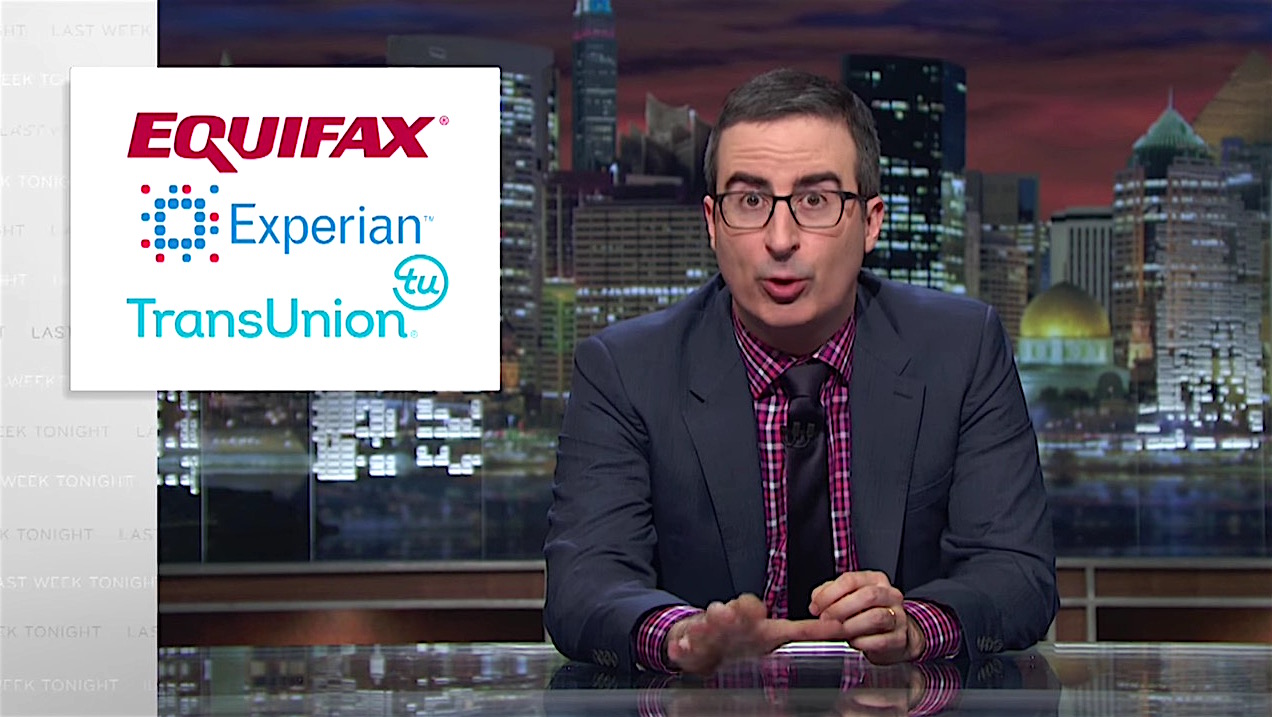John Oliver tries to give credit-reporting firms a taste of their own error-filled, life-wrecking medicine


A free daily email with the biggest news stories of the day – and the best features from TheWeek.com
You are now subscribed
Your newsletter sign-up was successful
Your credit score is probably the most important three-digit number in your whole life, John Oliver said on Sunday's Last Week Tonight. In fact, "you might be surprised just how many aspects of your life your credit report can affect," he said, noting, for example, that 47 percent of employers use credit scores when hiring. And the three major credit reporting agencies — Experian, Equifax, and TransUnion — all encourage those outside uses, arguing that good credit scores signify responsible employees. Oliver was skeptical. "Look at me," he said. "My credit is probably fine, but I routinely waste HBO's money on stupid costumes, pyrotechnic displays, and checkered dress shirts."
Tying credit scores to character and employment prospects doesn't make sense, in part because more than half of debt on credit reports is from medical expenses, "and it seems unfair to judge someone on that," Oliver said, but also because credit reports contain "a shocking number of errors." It would be bad enough if these errors — giving you somebody else's bad credit, for example, or misidentifying you as a terrorist, or dead — were contained to these three credit agencies, but now there are also hundreds of companies that offer some sort of background check.
"And at this point, you are probably thinking, 'Holy shit, I should probably check my background and credit reports,'" Oliver said. And that's easy with the credit agencies — though good luck correcting any errors — but really problematic with the Wild West of background-check services. Oliver's staff found only a such few services that let individuals pay for checks of themselves, and HBO paid for a few staffers' checks. There were errors.
The Week
Escape your echo chamber. Get the facts behind the news, plus analysis from multiple perspectives.

Sign up for The Week's Free Newsletters
From our morning news briefing to a weekly Good News Newsletter, get the best of The Week delivered directly to your inbox.
From our morning news briefing to a weekly Good News Newsletter, get the best of The Week delivered directly to your inbox.
"If only we could make this whole industry understand the jeopardy that they're placing people in," Oliver concluded, then added: "Do you know what? Maybe we can." His scheme doesn't make a whole lot of sense, but you have to credit his imagination in creating terrible, terrible companies. There is some slightly NSFW language and imagery, and some strange Neil Patrick Harris jokes. If that's okay with you, watch below. Peter Weber

A free daily email with the biggest news stories of the day – and the best features from TheWeek.com
Peter has worked as a news and culture writer and editor at The Week since the site's launch in 2008. He covers politics, world affairs, religion and cultural currents. His journalism career began as a copy editor at a financial newswire and has included editorial positions at The New York Times Magazine, Facts on File, and Oregon State University.
-
 Film reviews: ‘Send Help’ and ‘Private Life’
Film reviews: ‘Send Help’ and ‘Private Life’Feature An office doormat is stranded alone with her awful boss and a frazzled therapist turns amateur murder investigator
-
 Movies to watch in February
Movies to watch in Februarythe week recommends Time travelers, multiverse hoppers and an Iraqi parable highlight this month’s offerings during the depths of winter
-
 ICE’s facial scanning is the tip of the surveillance iceberg
ICE’s facial scanning is the tip of the surveillance icebergIN THE SPOTLIGHT Federal troops are increasingly turning to high-tech tracking tools that push the boundaries of personal privacy
-
 TikTok secures deal to remain in US
TikTok secures deal to remain in USSpeed Read ByteDance will form a US version of the popular video-sharing platform
-
 Unemployment rate ticks up amid fall job losses
Unemployment rate ticks up amid fall job lossesSpeed Read Data released by the Commerce Department indicates ‘one of the weakest American labor markets in years’
-
 US mints final penny after 232-year run
US mints final penny after 232-year runSpeed Read Production of the one-cent coin has ended
-
 Warner Bros. explores sale amid Paramount bids
Warner Bros. explores sale amid Paramount bidsSpeed Read The media giant, home to HBO and DC Studios, has received interest from multiple buying parties
-
 Gold tops $4K per ounce, signaling financial unease
Gold tops $4K per ounce, signaling financial uneaseSpeed Read Investors are worried about President Donald Trump’s trade war
-
 Electronic Arts to go private in record $55B deal
Electronic Arts to go private in record $55B dealspeed read The video game giant is behind ‘The Sims’ and ‘Madden NFL’
-
 New York court tosses Trump's $500M fraud fine
New York court tosses Trump's $500M fraud fineSpeed Read A divided appeals court threw out a hefty penalty against President Trump for fraudulently inflating his wealth
-
 Trump said to seek government stake in Intel
Trump said to seek government stake in IntelSpeed Read The president and Intel CEO Lip-Bu Tan reportedly discussed the proposal at a recent meeting
